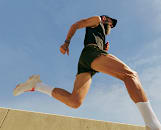
Guido Mieth / DigitalVision via Getty Images
Rest vs. Sleep: How They’re Different and Why Getting Enough of Each Matters
Sleep is only one form of physical rest, but the other types—like creative and social rest—are important too.
By Anna Medaris•
What’s the Difference Between Rest and Sleep?
Why You Need Enough Rest and Sleep
Tips for Getting Enough Rest
The Takeaway
Saundra Dalton-Smith, MD, was so burnt out from her work as an internal medicine physician that she considered leaving the field altogether. Instead, the doctor did what she’s always done: She started asking questions—and researching the answers.
Discover more ways to reach your goals with Peloton
“What is rest? What is sleep? Are they the same? Are they different?” Dr. Dalton-Smith wondered. “Why am I tired after sleeping? If my sleep was effective, then what’s the problem?”
Turns out, she learned, there are significant differences between rest and sleep, though the importance of the former tends to get overshadowed by society’s emphasis on the latter. “It’s not a situation where you only need rest or you only need sleep,” says Dr. Dalton-Smith, who went on to write the book Sacred Rest: Recover Your Life, Renew Your Energy, Restore Your Sanity.“You need both.”
Here’s exactly what constitutes rest vs. sleep, why they’re each crucial for health and wellbeing, and how to get more out of both.
What’s the Difference Between Rest and Sleep?
Sleep and rest share similarities, but they have key differences too. In short, sleep is a complex process that allows your body and brain to re-energize and process information, while rest is multifaceted and involves wakeful restoration. Sleep is one form of physical rest, but rest can take many different forms.
Let’s back up a bit. Sleep is a whole lot more complicated than closing your eyes and losing consciousness, researchers say. Rather, it’s “an active state of unconsciousness” where the brain is mostly only reacting to itself, rather than to the outside world, the authors of Physiology of Sleep write.
Scientists don’t entirely know, or even agree on, exactly why we sleep or what precisely happens when we do, but there are at least three key things going on, the Cleveland Clinic says: Your body is conserving energy and resupplying cells; repairing injuries; and allowing your brain to organize, process, and store memories and other information from the day.
“Sleep is a brain state where things happen in your body that are fundamentally incompatible with being consciously awake,” explains Michael Grandner, PhD, a licensed clinical psychologist and director of the Sleep and Health Research Program at the University of Arizona. “Your brain emits different brain waves; it sorts information in different ways and processes things in different ways. Your body releases different hormones.”
Rest, meanwhile, encompasses much more than just sleep. Contrary to popular perception, it also doesn’t mean just doing nothing, Dr. Dalton-Smith says. “The first thing most people have to disassociate from rest is that it’s only about cessation or stopping,” she says. “Rest is about restoration. It’s about bringing something back to a healthier state, pouring back into the place of deficit.”
Dr. Dalton-Smith defines seven types of rest:
Physical rest, which includes passive rest like sleeping and napping, and active rest like stretching, using a foam roller, or even adjusting your workstation to be more ergonomically friendly.
Mental rest, or quieting the mind to allow for better concentration and focus. As anyone who’s ever gone for a run to gain mental clarity knows, mental rest can be quite physically active.
Spiritual rest, or a feeling of belonging, acceptance, and purpose. This type of rest, perhaps counterintuitively, isn’t about retreating—but rather may be about reaching out to feel like you’re a part of something bigger.
Emotional rest, which can be especially necessary for people in leadership roles, as well as therapists, teachers, and even customer-service employees who “carry the emotions” of others, Dr. Dalton-Smith says. “That emotional backpack can start to get heavy, and it can start to have an effect on how you show up in the world.”
Social rest, or a break from the types of people who drain you, and stronger connections to those who give you energy and support.
Sensory rest, which might include using noise-cancelling headphones, dimming the lights, or changing out of scratchy clothes.
Creative rest, or engaging in activities that inspire you—say, taking a walk by the water or looking at art—after spending time problem solving, innovating, or otherwise taxing your creative reserves.
All in all, understanding the various types of rest and how they differ from sleep can ensure you’re using the right tools to solve various fatigue-related problems, Dr. Dalton-Smith says.
“If I have a creative rest deficit—in other words, I’m spending a lot of energy on problem solving and innovation—sleep won’t solve that. If the fatigue I’m having is relational—I’m spending a lot of time managing relationships—sleep doesn’t improve that. If the type of rest that I’m needing is being understood—emotional rest—sleep can’t solve that,” she says. “So sleep is a type of rest, but it does not sum up all of the areas that need resting in our lives.”
Why You Need Enough Rest and Sleep
The benefits of sleep are well-advertised: According to the American Academy of Sleep Medicine, healthy sleep lowers the risk of serious health problems like heart disease, prevents and manages mental health issues, boosts the immune system, improves brain health, supports healthy weight maintenance, elevates your mood, and enhances your decision-making.
When it comes to your fitness goals, consistent, quality sleep is critical too. A 2017 research article published in the journal Current Sports Medicine Reports notes that longer, higher-quality sleep appears to improve key markers of athletic performance, such as endurance, accuracy, and reaction time. On the flip side of the coin, poor sleep quality or sleep loss can hinder speed and strength, according to 2020 research published in Sleep Medicine Clinics. And in 2019, the International Olympic Committee called out just how important sleep is for athletes, noting that “sleep deprivation impairs athletic performance across many sports, and sleep improvement leads to improved performance.”
Elite athlete or not, Grandner says, “there is almost no amount of rest that will give you what one minute of sleep will do because it’s a fundamentally different process.”
But the benefits of rest ought to be equally appreciated too. And the two aren’t at odds. To the contrary, proper rest leads to better sleep, the experts agree. “If you’ve ever been in the bed and you tossed and turned because your brain won’t shut off, your sleep was impacted by a rest deficit that you had mentally,” Dr. Dalton-Smith explains. Without sufficient mental rest in that situation, your sleep may remain lighter and more fitful.
A similar phenomenon can occur after physically grueling events, like a marathon: Your body is so torn up that it might struggle to sleep that night. Only with time and appropriate physical rest will you be able to fully and deeply nod off, Dr. Dalton-Smith has found.
Rest is important on its own too—not just as a vehicle to get more or better sleep. “Waking rest,” or letting thoughts arise as they come as in meditation or any low-energy or repetitive activity like folding laundry or moving the lawn, allows the brain time to consolidate and process information, likely leading to improved mental health and wellbeing, researchers say.
Ultimately, if you skimp on rest or get the wrong kind (say, scrolling Instagram when what will really recharge you is journaling or taking a walk) in favor of sleep only, the consequences can catch up with you, Dr. Dalton-Smith says. “You then get to choose: Do you want to have some level of control over the healing process, or do you want to wait until the tendon snaps and now we have to go about it in a different way?”
Long story short: Making time for proper sleep and rest is key for your health, fitness, and wellbeing.
Tips for Getting Enough Rest
The first step towards getting more rest is identifying what type you need most and addressing that deficit first, Dr. Dalton-Smith says. Because, she adds, “the wrong type of rest is like no rest at all.”
So if you’re mentally spent, you might try doing a “brain dump” before bed to offload that mental chatter on paper. If you need emotional rest, a heart-to-heart with someone you trust could help revive you. If you’re fearing spiritually uninspired, volunteering might energize you. Creatively zapped? Taking in some natural beauty may help refill that well.
“If you are really intentional about restoring that area, you’ll start noticing the effects and the energy that comes from that a lot quicker, and then you can go to the next area,” Dr. Dalton-Smith says. “It’s usually not a large number of changes you have to make in your life.” The changes don’t have to take a lot, if any, time either, she adds. For example, sometimes a fix for sensory fatigue could be as simple as taking a five-minute break in a dark, quiet room.
One word of caution from Grandner: Don’t confuse resting with lying in bed if your goal there is to sleep. In that case, it’s better to get up and do a relaxing activity, like reading or puzzling, until you get drowsy again. Otherwise, “you’re programming yourself to be awake in bed and getting used to being awake in bed, and then you’re stressing about not sleeping,” he says. “I have no problem with people lying in bed resting—unless that creates problems later.”
The Takeaway
Rest and sleep aren’t the same thing, and sleep is only one type of rest. The other types, ranging from emotional rest to creative rest, don’t necessarily mean stopping what you’re doing, but rather, refilling whatever well is depleted in an appropriate way.
Both rest and sleep are important for health, fitness, and wellbeing, and prioritizing rest doesn’t come at the expense of sleep. It actually supports deeper sleep.
To get better rest (and therefore sleep), identify one type you need more of first, and focus on satisfying that. As you continue to integrate high-quality, targeted rest throughout your day, the benefits will only compound, experts say.
Related Articles

Yoga
These 9 Restorative Yoga Poses Will Give You the Relief You're Craving

Sleep
8 Possible Reasons Why You Always Wake up Tired, No Matter How Much Sleep You Get

Health
Quick Question: Are You Taking Enough Workout Rest Days Each Week?

Yoga
Tap Into the Calming Power of Restorative Yoga to Reboot Your Nervous System
This content is for informational and educational purposes only and does not constitute individualized advice. It is not intended to replace professional medical evaluation, diagnosis, or treatment. Seek the advice of your physician for questions you may have regarding your health or a medical condition. If you are having a medical emergency, call your physician or 911 immediately.
Get your best Zzzs yet
Enter your email to get articles, expert-backed tips, and updates from Peloton sent to your inbox.
By providing your email address, you agree to receive marketing communications from Peloton.
For more about how we use your information, see our Privacy Policy.








